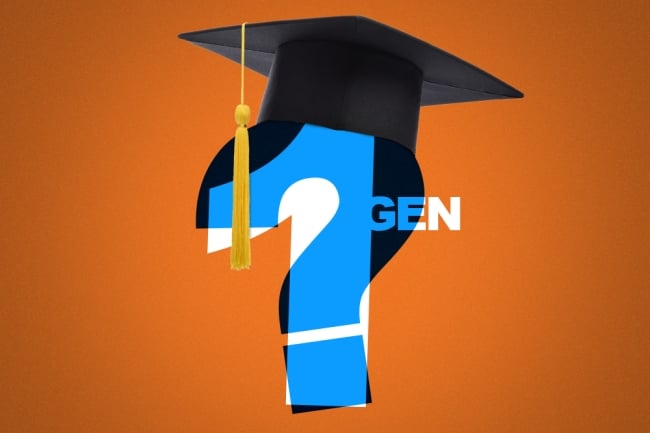You have /5 articles left.
Sign up for a free account or log in.

First-generation students have gone online to try to figure out whether they qualify for financial aid and other student supports.
Photo illustration by Justin Morrison/Inside Higher Ed | iStock/Getty Images
A high school junior who is thinking ahead about college wants to know if he can identify as a first-generation student on applications and qualify for financial and academic support tied to that status. His mother has a master’s degree, but she attended college outside the U.S. and is unable to help him navigate the American college application process.
The student knows he will face challenges typically associated with first-generation status such as navigating the academic and social dynamics of college, learning how to apply for financial aid, and figuring out the course load needed each semester in order to graduate on time. But he’s unsure if he even qualifies as a first-generation student, and the contradictory and confusing information on the websites of the colleges he’s considering certainly don’t help.
Brown University broadly defines first generation as “any student who may self-identify as not having prior exposure to or knowledge of navigating higher institutions.” Harvard University has a narrower definition that considers students first-generation if they will be first in their "immediate family to graduate from a four-year college or the equivalent." The criteria run the gamut at various institutions, whether public or private, selective or open access.
The student wants to know if he’d qualify as first generation at one institution and not at another. He’s not the only one asking. Queries like his are scattered across online platforms such as College Confidential and Reddit as students seek a common definition for what it means to be first generation. But they’re searching for something they won’t find.
“It’s just really messy,” said Sarah Whitley, vice president of the Center for First-generation Student Success, an initiative of NASPA, an association for student affairs professionals. “You have some students who are getting all the services and other students not getting anything.”
The debate over who qualifies as first generation is not new, and the definitions have long varied. But the Supreme Court’s recent ruling prohibiting affirmative action in college admissions has renewed those discussions. Higher ed administrators are now seeking alternative methods for enrolling diverse classes without running afoul of the law. First-generation students—many of whom are people of color—may be an answer.
“We know people have been thinking about first gen as we’ve seen changing demographics even prior to the court’s decision,” Whitley said. “But I think the Supreme Court decision is going to amp this up pretty tremendously.”
Whitley said the center is getting “a tremendous demand” for advice on establishing or strengthening first-generation programs.
“We have about 350 universities nationally in what we call our First Scholars Network, and we’ve just admitted another 76 institutions from a competitive process.”
Reinforcing a Trend
Maureen Hoyler, president of the Council for Opportunity in Education, which is focused on helping low-income and first-generation students access higher education, expects the surge in interest in these students to continue.
“I think the Supreme Court decision can only reinforce that trend,” Hoyler said.
Wake Forest University announced a new initiative today "to further lower barriers to undergraduate admission for first-generation college students" by offering first-generation applicants an early decision option as "an additional pathway of opportunity."
The new "Early Action plan" is scheduled to launch this fall and lets first-generation applicants "know that the University values their experience and wants to create more opportunity for them,” Eric Maguire, the university's vice president for enrollment, said in a press release.
Maguire, who was the first in his family to graduate from college, said university administrators are “focused on continually improving opportunity and accessibility and this is one important way to do that."
Wake Forest already has recruitment and other targeted programs for first-generation students, including a program that provides scholarships, academic support, study abroad opportunities and counseling
The term “first generation” was first codified in federal law in 1980 and was developed out of a desire to find a common eligibility criteria with a positive connotation for TRIO, federal support programs for students from disadvantaged backgrounds. The law deems students eligible if neither of their parents completed “a baccalaureate degree.” It also only considers the education status of the parent or parents with whom the student lived.
Hoyler believes first-generation status is getting renewed attention because of its focus on education level rather than on race, and is viewed as a “very positive,” “fair” and politically acceptable” term that “people understand.”
She said the Supreme Court ruling has made college administrators “reluctant to utilize race or ethnic eligibility criteria,” to select students for targeted academic support and financial aid programs.
“There’s a greater understanding of class and trying to equalize opportunity around class,” she said. “People get why individuals from families that are first generation need assistance. It’s one of the reasons TRIO has bipartisan support.”
While Whitley views first-generation status as a recruitment opportunity for institutions grappling with the court ruling, she also warned that institutions should avoid using the label in “inappropriate ways” as “cover up efforts” for affirmative action policies.
“In some states that have anti-DEI legislation, folks are saying, ‘Oh, well, we can’t have this program anymore, but we could just call it first gen and that’ll make it OK,’” Whitley said. “The appropriate students need to be selected for those programs. It really does need to be a first generation–focused effort.”
Unnoticed ‘Subtleties’
But identifying those students can be challenging even at colleges with long-standing programs for first-generation students.
Collin Hill, a research analyst for postsecondary education at MDRC, a nonpartisan research group, noted “a lot of subtleties that go unnoticed” in the two most common definitions of a first-generation student—one whose parents attended but did not graduate from college or one whose parents never took college courses.
“In an ideal world, we’d have a broad and inclusive and standardized definition,” Hill said. But in a world where variation does exist, “I think it’s on institutions and individual programs at those institutions to really clearly communicate if they have eligibility standards.”
Monmouth University, a small private institution in New Jersey, does have a clearly defined standard for what constitutes first generation, and university officials don’t intend to change it.
“Highly selective institutions have statistically much lower numbers of first-generation and low-income students,” said Zaneta Rago-Craft, director of Monmouth’s Intercultural Center. “There might be other institutions that are looking to increase those numbers in lieu of the Supreme Court decision, but for us, we’ve been increasing those numbers and want to keep that momentum.”
She said she and other student support officials have noticed more variation in whether students embrace their first-generation identity and take advantage of services that come with the label.
“We often spend a lot of our time destigmatizing being the first in your family to attend a college and letting folks know that it’s OK to not know exactly where to go … and to lean on some of the support structures.”
Hoyler and Whitley cited other variables in the definition, such as whether either parent earned an associate degree but not a bachelor’s degree, or if the educational background of siblings or grandparents should be considered. Other considerations might involve determining whether nonbiological guardians actively present in a student’s life should be viewed as parents, and if absent biological parents should be considered.
Hill cited other indirect factors such as whether parents earned degrees at a traditional college age or in another country or were part-time students.
“All of those things will mean that their parents had a different college-going experience than the student might have,” Hill said. “There’s a lot of levels and gradations, all of which correspond to very different backgrounds and needs for support.”
He views the variation in definitions as “an effort to make programs as inclusive as possible” and believes “Any one definition can be really limiting and exclude students who don’t have access to the kind of social capital that comes with going to college.”
Robert Toutkoushian, a professor of higher education and associate director at the University of Georgia’s Institute of Higher Education, published a research report in 2015 that determined that the percentage of students who qualify as first-generation can range from as low as 22 percent to as high as 77 percent depending on which of eight different definitions of first generation are used. Toutkoushian, who said he was a first-generation college student, found that even under broader definitions that considered a student first generation even if the student had one parent who went to college, those students were “still at a significant disadvantage” academically and less likely to go to college and graduate than students with two parents who graduated from college.
“The narrative for first-generation students is that if neither parent had gone to college, you’re less likely to do so because your parents aren’t encouraging it or don’t talk about it at home,” he said. “Yet, here’s a group of students who … should have some familiarity with it and some exposure to it, and they were still less likely to go to college and earn a degree.”
Although there’s not likely to be consensus on first-generation status, the broadening definitions of the term will mean larger numbers of first-generation students on campuses and increased costs in serving them.
“The most important implication here is that some kids, even with a more lenient definition of first-generation status, still need some help,” Toutkoushian said. “If the definition that’s used for a support program is too narrow, they’re missing out on help that they need.”








